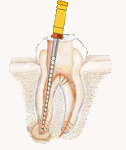
Root Canal and Pregnancy
Root canal treatment is the only way to save a badly infected and abscessed tooth from extraction. But is it safe to have a root canal during pregnancy?
Many pregnant women are concerned about the consequences of a root canal procedure to their fetus. Obstetricians suggest that it is best to avoid exposing the developing baby to any risks, even if they are minimal. The safest course of action is to postpone all unnecessary dental work until after the birth. Unfortunately, it is not the same to postpone a root canal treatment as it is to postpone a teeth whitening.
Potential risks related with root canal during pregnancy
Potential risks of having a root canal treatment during pregnancy are associated with:
- X-rays. It is important for the success of a root canal treatment, the dentist to have good knowledge of how extensive is the infection
and of the internal structure and shape of the tooth roots. An x-ray is necessary in order to provide that information.
According to the American College of Radiology, no single diagnostic x-ray has a radiation dose significant enough to cause adverse
effects in a developing embryo or fetus.
Besides that, dental x-rays are aimed locally at the mouth and not the abdomen area.
As an extra precaution, dentists usually provide pregnant women with an additional lead shield to stop any x-rays from reaching to the abdomen.
Another worry associated with pregnancy is related to the prescribed medications and the chemicals used during the procedure: - Anesthesia. The anesthetics that dentists use are safe for pregnant women. However, the amount of anesthesia administered to pregnant women is as little as possible. If the initial dose is not enough, the dentist will provide additional anesthesia until the patient feels comfortable. Pain increases stress, and stress could be more harmful to the baby than a little more anesthetic.
- Other chemicals. Neither the cleaning fluid used during the procedure (usually sodium hydrochloride or bleach), nor the filling materials pose any danger to the fetus.
- Antibiotics. Prescription of antibiotics is common to fight the tooth infection. Dentists prescribe, during or after the treatment, specific antibiotics (such as penicillin or amoxicillin) which are rated as safe for pregnancy.
What is the risk of NOT having a necessary root canal during pregnancy?
If the dentist recommends a root canal during pregnancy, it means that the dangers of a decision to postpone treatment are much higher than those of the root canal procedure. The risks for pregnant women are associated with:
- Pain. Conditions such a tooth abscess that need root canal therapy are usually accompanied by severe toothache. Continuous pain during pregnancy can be a really stressful condition with potentially negative effects to the mother and fetus.
- Infection. The conditions when a root canal is recommended during pregnancy always involve tooth infection. If the infection is left untreated for a long time, the infection can spread throughout the body causing severe complications. This is a condition that will put a pregnancy into significant danger.
A safer approach to a root canal during pregnancy
Obstetricians consider the first trimester as the most crucial for the development of the fetus. Any non-emergency dental work in the 1st trimester should be postponed until the 2nd trimester, to avoid all potential risks. If needed the dentist can open an abscessed tooth to allow drainage and pain relief, and clean the pulp area as good as possible.
Later, when pregnancy enters the second trimester, an X-ray can be taken to allow the completion of the root canal treatment. The same procedure can be followed for a problem during the third trimester; final treatment is postponed until after the birth, if possible.
A root canal during pregnancy can be a perfectly safe procedure with no side effects on the fetus.
Be sure to let your dentist know that you are pregnant before he decides the proper way and time of treatment for your dental problems.
How to prevent the need of a root canal during pregnancy
The best way to prevent any risks of a root canal during pregnancy is not to need one. Some simple ways to accomplish that are:
- Follow a proper daily oral hygiene routine. Brush your teeth at least twice a day and floss daily.
- Have a balanced diet. Limit sugar consumption as possible.
- Do not miss any preventive dental exams and cleanings during pregnancy.
Maintaining good oral health is the only way to avoid the need of a root canal during pregnancy.
![]() The cost involved with dental treatments is significant and many patients may not afford it if they are not covered by their dental insurance.
Learn how to choose a dental insurance plan that will help you provide the best dental treatment to yourself and your family.
The cost involved with dental treatments is significant and many patients may not afford it if they are not covered by their dental insurance.
Learn how to choose a dental insurance plan that will help you provide the best dental treatment to yourself and your family.

